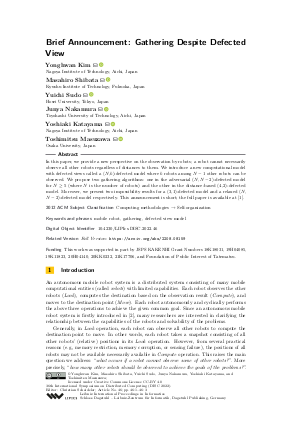Brief Announcement: Gathering Despite Defected View
Authors
Yonghwan Kim  ,
Masahiro Shibata
,
Masahiro Shibata  ,
Yuichi Sudo
,
Yuichi Sudo  ,
Junya Nakamura
,
Junya Nakamura  ,
Yoshiaki Katayama
,
Yoshiaki Katayama  ,
Toshimitsu Masuzawa
,
Toshimitsu Masuzawa 
-
Part of:
Volume:
36th International Symposium on Distributed Computing (DISC 2022)
Part of: Series: Leibniz International Proceedings in Informatics (LIPIcs)
Part of: Conference: International Symposium on Distributed Computing (DISC) - License:
 Creative Commons Attribution 4.0 International license
Creative Commons Attribution 4.0 International license
- Publication Date: 2022-10-17
File

PDF
LIPIcs.DISC.2022.46.pdf
- Filesize: 0.51 MB
- 3 pages
Document Identifiers
Related Versions
- Full Version https://arxiv.org/abs/2208.08159
Subject Classification
ACM Subject Classification
- Computing methodologies → Self-organization
Keywords
- mobile robot
- gathering
- defected view model
Metrics
- Access Statistics
-
Total Accesses (updated on a weekly basis)
0PDF Downloads0Metadata Views
Abstract
In this paper, we provide a new perspective on the observation by robots; a robot cannot necessarily observe all other robots regardless of distances to them. We introduce a new computational model with defected views called a (N,k)-defected model where k robots among N-1 other robots can be observed. We propose two gathering algorithms: one in the adversarial (N,N-2)-defected model for N ≥ 5 (where N is the number of robots) and the other in the distance-based (4,2)-defected model. Moreover, we present two impossibility results for a (3,1)-defected model and a relaxed (N, N-2)-defected model respectively. This announcement is short; the full paper is available at [Yonghwan Kim and others, 2022].
Cite As Get BibTex
Yonghwan Kim, Masahiro Shibata, Yuichi Sudo, Junya Nakamura, Yoshiaki Katayama, and Toshimitsu Masuzawa. Brief Announcement: Gathering Despite Defected View. In 36th International Symposium on Distributed Computing (DISC 2022). Leibniz International Proceedings in Informatics (LIPIcs), Volume 246, pp. 46:1-46:3, Schloss Dagstuhl – Leibniz-Zentrum für Informatik (2022)
https://doi.org/10.4230/LIPIcs.DISC.2022.46
BibTex
@InProceedings{kim_et_al:LIPIcs.DISC.2022.46,
author = {Kim, Yonghwan and Shibata, Masahiro and Sudo, Yuichi and Nakamura, Junya and Katayama, Yoshiaki and Masuzawa, Toshimitsu},
title = {{Brief Announcement: Gathering Despite Defected View}},
booktitle = {36th International Symposium on Distributed Computing (DISC 2022)},
pages = {46:1--46:3},
series = {Leibniz International Proceedings in Informatics (LIPIcs)},
ISBN = {978-3-95977-255-6},
ISSN = {1868-8969},
year = {2022},
volume = {246},
editor = {Scheideler, Christian},
publisher = {Schloss Dagstuhl -- Leibniz-Zentrum f{\"u}r Informatik},
address = {Dagstuhl, Germany},
URL = {https://drops.dagstuhl.de/entities/document/10.4230/LIPIcs.DISC.2022.46},
URN = {urn:nbn:de:0030-drops-172377},
doi = {10.4230/LIPIcs.DISC.2022.46},
annote = {Keywords: mobile robot, gathering, defected view model}
}
Author Details
Funding
This work was supported in part by JSPS KAKENHI Grant Numbers 18K18031, 19H04085, 19K11823, 20H04140, 20KK0232, 21K17706, and Foundation of Public Interest of Tatematsu.
References
- Yonghwan Kim et al. Gathering despite defected view, 2022. URL: https://doi.org/10.48550/ARXIV.2208.08159.
-
Ichiro Suzuki and Masafumi Yamashita. Distributed Anonymous Mobile Robots: Formation of Geometric Patterns. SIAM J. Comput., 28(4):1347-1363, 1999.

